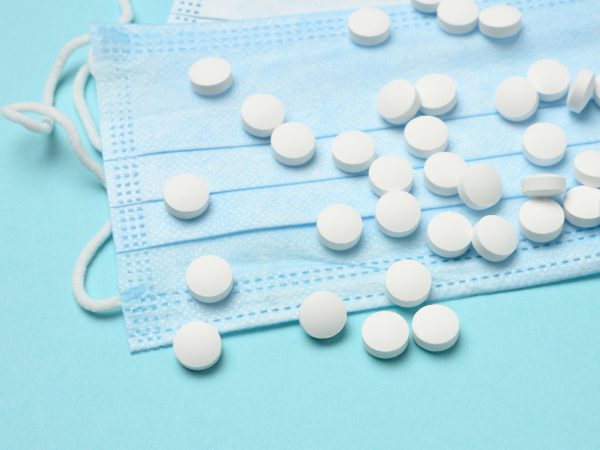Can Ivermectin Help Prevent COVID-19?
I’ve read about ivermectin as a way to protect myself against COVID-19. Should I take it?
Andrew Weil, M.D. | August 17, 2021

Since it was developed in the 1970s in Japan, ivermectin has been used around the globe to control parasitic infections in cattle, and it is commonly used to prevent heartworm and other parasites in dogs. It has been used in humans for more than three decades to treat the parasitic diseases onchocerciasis (river blindness) and lymphatic filariasis, two of the most common tropical scourges. Ivermectin has also been shown to have limited antiviral activity, so it’s no wonder that an anxious world in the grip of a viral pandemic would look to this drug for help. Unfortunately, there is no evidence that ivermectin is effective either as a preventive measure or a treatment for Covid-19.
There have been a number of recent studies and scientific papers about ivermectin’s potential as a therapy against the SARS-CoV-2 virus, but many of them have been based on flawed or insufficient data and some have been withdrawn from publication. Some researchers theorized that ivermectin could block the coronavirus from gaining entry into the nucleus of our cells, but, again, we simply don’t have the evidence.
Regarding its safety, several African studies have looked at ivermectin’s ability to kill mosquitos that fed on adults who had taken the drug; the study concluded that ivermectin could be an effective tool against malaria if used in a mass distribution program, with no significant risk of harm at the doses that were tested. It’s important to remember, though, that ivermectin also has the potential for significant adverse effects, including nausea, vomiting, diarrhea, skin rash, dizziness, seizures, and hepatitis. It is available by prescription for use in animals, and under controlled circumstances for some uses in humans. I advise against using it unless you are part of an approved clinical trial.
Our best weapon against the coronavirus remains the vaccine. Vaccinated people with healthy immune systems have the best odds of avoiding infection or having only a mild illness if they do get infected. Maintaining vigilance with hygiene – hand washing, social distancing, and masking when needed – has also proven effective. You might also consider natural products for boosting resistance, including garlic, medicinal mushrooms, astragalus, and vitamin C. See my advice about what to take, and what to avoid, to stay healthy during the pandemic.
Andrew Weil, M.D.
Sources:
Baker N, Reardon S. Coronapod: “Ivermectin, what the science says.” Nature. 2021 Aug 6. doi: 10.1038/d41586-021-02178-2. Epub ahead of print. PMID: 34363064. https://pubmed.ncbi.nlm.nih.gov/34363064/ https://www.nature.com/articles/d41586-021-02178-2
Crump A, Ōmura S. “Ivermectin, ‘wonder drug’ from Japan: the human use perspective.” Proc Jpn Acad Ser B Phys Biol Sci. 2011;87(2):13-28. doi: 10.2183/pjab.87.13. PMID: 21321478; PMCID: PMC3043740. https://pubmed.ncbi.nlm.nih.gov/21321478/
Smit MR, Ochomo EO, Aljayyoussi G, Kwambai TK, Abong’o BO, Chen T, Bousema T, Slater HC, Waterhouse D, Bayoh NM, Gimnig JE, Samuels AM, Desai MR, Phillips-Howard PA, Kariuki SK, Wang D, Ward SA, Ter Kuile FO. “Safety and mosquitocidal efficacy of high-dose ivermectin when co-administered with dihydroartemisinin-piperaquine in Kenyan adults with uncomplicated malaria (IVERMAL): a randomised, double-blind, placebo-controlled trial.” Lancet Infect Dis. 2018 Jun;18(6):615-626. doi: 10.1016/S1473-3099(18)30163-4. Epub 2018 Mar 27. PMID: 29602751. https://pubmed.ncbi.nlm.nih.gov/29602751/
Foy BD, Alout H, Seaman JA, Rao S, Magalhaes T, Wade M, Parikh S, Soma DD, Sagna AB, Fournet F, Slater HC, Bougma R, Drabo F, Diabaté A, Coulidiaty AGV, Rouamba N, Dabiré RK. “Efficacy and risk of harms of repeat ivermectin mass drug administrations for control of malaria (RIMDAMAL): a cluster-randomised trial.” Lancet. 2019 Apr 13;393(10180):1517-1526. doi: 10.1016/S0140-6736(18)32321-3. Epub 2019 Mar 14. PMID: 30878222; PMCID: PMC6459982. https://pubmed.ncbi.nlm.nih.gov/30878222/












